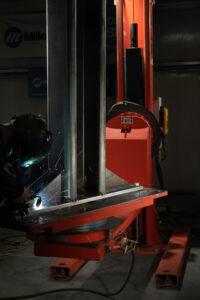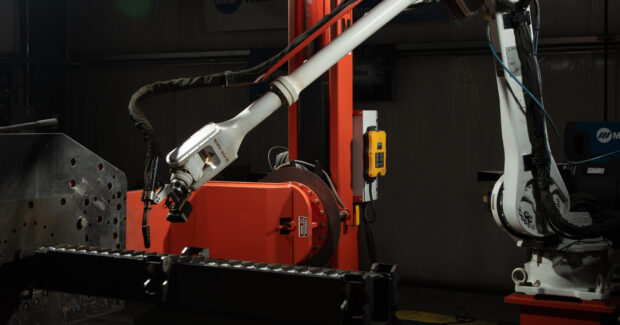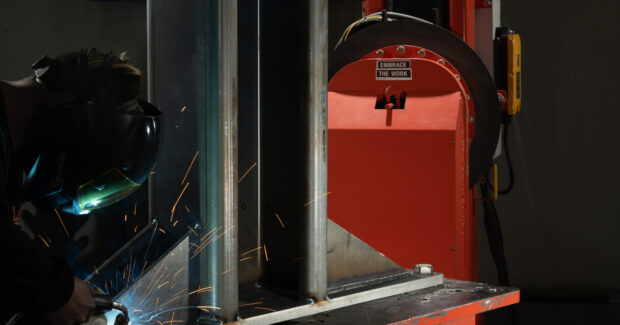Five Ways Positioners Boost Productivity in Welding
Unsure about the value of welding positioners? ALM Positioners shares five ways positioners can boost productivity in the workplace.
Posted: July 25, 2023

For any industry, it’s important to maximize productivity while enhancing safety and maintaining employee morale.
For the manufacturing industry, this is perhaps more important than ever as hundreds of thousands of skilled labor jobs remain open, and manufacturers are scrambling to fill them.
The solution? Welding positioners – a sure way to achieve faster, better and safer production while maintaining the required standards.
Since its inception, ALM Positioners, Inc. has delivered a variety of positioners that help daily manufacturing operations. By pinpointing inefficiencies associated with welding, assembly and labor, ALM Positioners has built a range of products that streamline the welding and assembly processes.
Still not sold on the value of welding positioners? Here are five ways positioners can boost productivity in the workplace.
- Increasing productivity, reducing downtime
Time is of the essence in metal fabrication and manufacturing. With positioners, welders can work more comfortably for longer periods of time. With workpieces and parts properly positioned, welders can work faster, with less exhaustion and less downtime, as the days of attempting to move workpieces with chains, forklifts and cranes are long gone.
ALM Positioners’ customers see increased throughput of as much as 40 percent and a return on investment in less than 12 months after one positioner is introduced into the production process.
For less experienced welders, positioners allow welders to learn the job processes quickly, meaning production continues as needed even when skilled workers are absent, and new employees are still learning.
Looking to boost productivity even further? Consider upgrading to a programmable or interrogator control platforms. Programmable controls offer a one-touch automated positioner for maximum operator efficiency and process conformity. Our robotic-integrated control package is designed for fully automated solutions.
- Improving welding quality
One of the main advantages of welding positioners is consistent, high-quality welds. The weldments are held in a fixed position, preventing any movement that compromises quality. When workpieces are well-fixed, it guarantees maximum weld penetration and deposition rate – not to mention a 360-degree rotation at a speed and position comfortable for each welder. When welders aren’t bending over or wrestling with heavy parts, they can work on what’s most critical – welding.
For enhanced weld quality verification, intelligent, robotic and automated positioners can also be integrated into weld management software.
- Increasing factory and employee safety
It’s no surprise that working on and positioning large weldments can not only be physically demanding but also potentially dangerous. The good news? Positioners are one of the best ways to ensure employee safety in the warehouse.
Hooking large, heavy parts and fixtures to chains, forklifts and cranes can be dangerous and time-consuming. With positioners, it’s easy to raise and position weldments or parts to an optimal height, rotation and working position within minutes without compromising the welders’ safety.
Positioners allow operators to safely speed up the handling portion of rotating and lifting a part and orienting it for the best access – requiring less manpower, saving labor hours and increasing the welder’s arc time.
- Improving ergonomics for happier and healthier employees
Not only is productivity increased but employees using positioners are safe, happy and healthy. As the current welding workforce becomes slimmer by the day, attracting and retaining skilled welders is crucial for any manufacturer.
Part of the reason employee retention is challenging in some skilled labor careers is the physical toll it can take on the body. Improved ergonomics can play a big role in solving this issue, as many job seekers are looking for manufacturers that demonstrate a commitment to their team’s well-being.
With the help of a positioner, employees will no longer need to crawl under and over the part, using ladders and scaffolding, kneeling, lying on the floor or rolling on creepers. When employees can elevate and rotate the part with the help of a positioner, they can keep the part in optimum processing position while working comfortably.
Ergonomics also plays a role in retaining workers and attracting highly skilled and talented ones. While veteran workers know how to best position parts, new ones can quickly learn how to work with welding positioners in no time.
- Providing customized solutions for any industry
When a custom problem arises, a custom solution is needed. With ALM, positioners can be tailored to the unique demands of any manufacturing challenge and engineered with versatility in mind.
With more than 40 positioner styles with customizable controls and features, ALM Positioners provides a value-added solution that only requires a small footprint on the production floor. Automatic or robotic positioners can also be programmed for specific welding needs and requirements, easing the welders’ work while ensuring uniformity, consistency and quality.
Subscribe to learn the latest in manufacturing.





